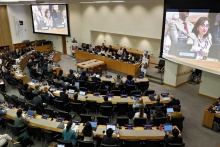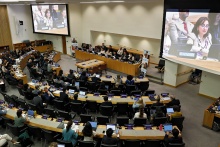I attended last week the Urgent Humanitarian Response Conference for Gaza – A Call for Action where UN Women brought a gender perspective to the response to a most dire situation. I welcome the recent Security Council Resolution 2735 and I hope that it will be fully implemented. The need for a permanent ceasefire, the release of all hostages, unhindered, immediate and gender-responsive humanitarian access, and an unwavering commitment to a two-state solution have never been more urgent.
The gender lens that UN Women brings to crises response is no less imperative in Ukraine, where fighting is still ongoing. Last week, at the Ukraine Recovery Conference in Berlin, we launched the Alliance for Gender-Responsive and Inclusive Recovery, working to ensure women´s voices are leading in early recovery efforts. We thank Germany and all our partners for joining the Alliance.
UN Women is proud to stay and deliver across crises contexts, even in the most dire of circumstances.
In Afghanistan, where 1000 days have passed since girls could access secondary education.
In Sudan, where the window to act for peace narrows with each passing day.
In Haiti, Myanmar, the Sahel and Yemen and elsewhere, we continue to work towards peace in all these contexts, and more.
Where there is crisis, women step up.
Women’s rights organizations working in the most difficult circumstances are raising their voices, drawing the world’s attention to gender-based violence and the collapse of essential services.
Crisis is never gender-neutral. But as the demands of crisis outpace our resources to respond, we must alongside recognition of vulnerability, also realize that there is no better crisis-response investment than in women´s agency, voices and leadership.
The 12 to 18 months before us may be a genuine inflection point.
We will see the Summit of the Future, Beijing+30 and CSW69, and the 25th anniversary of Security Council Resolution 1325.
It is, I am sure, our shared ambition that Beijing+30 be a true milestone in the journey to equality. We are determined as UN Women to play our part.
We know that we cannot and will not meet that ambition with rhetoric. Let us instead be judged by results.
We will seek to bring the spirit of the Beijing Conference to our commemorations, and to make it real and relevant to young people in particular.
We will push for greater investment in women’s rights organizations, especially those working with the most marginalized.
But most of all, we will hold ourselves, collectively, accountable for real change in the lives of women and girls as the only real way to commemorate 30 years of the Beijing Platform for Action. That is my challenge to you as Member States, and my challenge to us all.
We face this challenge at a time not only of crisis but also of change.
In this year of elections, we already see new governments and political configurations taking shape.
Citizens, and in particular women and girls, will watch in the hope that the cause of gender equality will be at the heart of these new political projects; that promises made become promises kept; that fears of pushback become realities of pushing forward; and that real progress is made.
We should feel the weight and pressure of these hopes and be ever more determined to live up to them. And we should be honest that at present we are not.
Barely half of the world’s women participate in the global workforce, compared with nearly three out of every four men.
When they do work, women earn an average 20 per cent less than men.
1 in 10 women live in extreme poverty.
614 million women and girls live in conflict-affected areas and are nearly 8 times more likely to live in poverty than men.
In every region of the world, women and girls are more food insecure. Climate change will leave 236 million more women and girls hungry by 2030, twice as many as men.
And on average, over five women or girls are killed every hour worldwide by someone in their own family.
It really does not need to be like this. Through our shared efforts change is happening and happening now.
Earlier this year, in Chile, I met young women who, through UN Women´s partnership with the European Southern Observatory, are becoming space engineers, a field still 90 per cent male.
In Türkiye last month I saw how UN Women´s partnership with Government, civil society and the private sector in Kahramanmaras has created safe spaces for women, a community structure, community leadership opportunities, and income generation.
It is my privilege as the UN Women Executive Director to have witnessed these examples and much more.
It is also my privilege to share my Annual Report. It provides powerful examples of the ways in which we have enabled, influenced, supported and empowered.
It describes how we carried out our coordination role in the UN system.
From our position in the Inter-Agency Standing Committee (IASC) we ensured that some 80 per cent of humanitarian response plans included gender equality priorities.
With UN Women’s support, 80 per cent of United Nations Country Teams that developed Cooperation Frameworks in 2023 prioritized gender equality.
The Secretary-General’s Gender Equality Acceleration Plan places gender equality and women’s rights at the centre of the United Nations’ agenda and work across human rights, development, peace and security. The Plan’s success will depend on partnership and collaboration with and across the Executive Boards and more widely with Member States, civil society and other stakeholders. We look forward to working with all of you to make it a reality.
In our normative role, as a result of UN Women’s advocacy, the Security Council integrated language on women, peace, and security into 55 per cent of its resolutions in 2023.
We worked extensively with our partners to advance legal rights for women and girls. As a result, in 78 countries, 2.8 billion women and girls now have a more supportive legislative and policy environment. This included supporting the adoption, revision or repeal of 248 laws across 39 countries, home to 1.4 billion women and girls; and in 15 countries supporting the adoption of comprehensive, coordinated strategies for preventing violence against women.
UN Women helped strengthen statistical systems in 58 countries, to ensure statistical systems include the priorities of women and girls. Policies in 32 countries are now based on gender data and statistics, because of UN Women’s support.
And over nine and a half million women, across 79 countries, including many survivors of violence and internally displaced women and refugees, accessed information, goods, resources and/or services through our programmes of cooperation.
UN Women’s Strategic Plan emphasizes the importance of the women’s movement and grassroots organizations.
That is why, in 57 countries, UN Women directly disbursed some $110 million for their crucial work, often in the most difficult of circumstances of conflict and crises.
Generation Equality continues to drive commitments, resources, and accountability and has spurred $47 billion of investment to date.
We implemented a record of $1.09 billion over the first two years of our Strategic Plan, a testament to the confidence of our funding partners and the programme partners with whom we deliver.
85 per cent of Strategic Plan development results indicators and 78 per cent of organizational efficiency and effectiveness indicators for which we had data showed good performance in 2023.
UN Women also received a twelfth unqualified audit opinion from the United Nations Board of Auditors and met both 2022 and 2023 milestones for the implementation of internal and external audit recommendations.
Our funding partners expressed their growing trust in us with increases in both regular and other resources.
Importantly, for only the third time since our establishment, our regular resources grew faster than other resources.
I am grateful for this clear expression of trust and commitment to the Funding Compact and the decisions made under the Structured Dialogue in this esteemed Executive Board.
This year, as four years ago, my Annual Report is presented alongside the headline results of our Mid-Term Review (the MTR).
The MTR highlighted the impact of our work on leaving no one behind, social norms change, climate change, private sector engagement and technology and innovation.
It acknowledged our achievements in coordination within the UN family but also pushed us to find even stronger incentives for joint work.
The MTR also highlighted advances in organizational efficiency and effectiveness including strengthened internal governance and risk management and control processes. At the same time, it identified the need to better deliver, measure and communicate country and global level results.
The MTR informs our thinking as we begin the preparation of our next Strategic Plan, where we will seek, again, a major evolution in the way we implement our mandate. We look forward to working with you on this.
Since I took office nearly three years ago, you had my promise that I would ensure transparency and trust; that UN Women 2.0 would be stronger, better integrated, more efficient and effective. A part of this journey is pivoting our focus to countries and regions, including moving our personnel closer to those we serve.
We have already delegated more authority to the regional level and increased resources to our regional and country offices, and a commitment to remain compliant with our core formula.
I am pleased now to share with you the updated timeline of this process and its next steps.
Over the past several months, we have been undertaking an extensive analysis of global functions that can be potentially relocated from New York to other duty stations – that will generate efficiencies as well as greater effectiveness, being closer to our partners and in time zones covering most of our offices.
We are also consulting with our sister agencies who have conducted similar processes and will continue to use their lessons learned in our decisions and their implementation. We intend to make significant progress in terms of decisions on relocating global functions during the course of this year, with the actual relocation expected to be completed by the end of 2025.
Communication, both with our personnel and Staff Council representatives, as well as with the Executive Board will remain an important element of this process of pivoting our focus to countries and regions. This dialogue will be intensified over the coming months as we consider how we can most effectively support results for women and girls at the country level.
We have a busy session ahead of us with an unprecedented seven decisions to agree, covering my annual report on the strategic plan, evaluation, the ethics function, United Nations Development System reforms, preventing sexual abuse and sexual harassment, and the joint report of the JIU on governance of the Executive Boards.
I look forward to all these discussions and to arriving at productive decisions that will strengthen us in the crucial months ahead.
Our Board is our closest partner and our most honest friend. I thank you all for your partnership and for your collaboration.
It is our job, together, to conduct the business of our agenda, but also to continue to pursue the mandate we collectively hold so dear.
We will do so into the Summit of the Future, into Beijing+30, CSW69, the 25th anniversary of Security Council Resolution 1325 next year, and the crucial acceleration of efforts to meet the 2030 Agenda and in particular SDG5. We will do so to preserve the credibility of the promises we make, and to deliver for women and girls.
It is our job, together, to recruit voices alongside ours, so that the movement of equality grows and becomes ever more unstoppable.
And it is our job, together, to make this moment of inflection one we will collectively look back on with pride. We can, we must, and we will.
I thank you.

